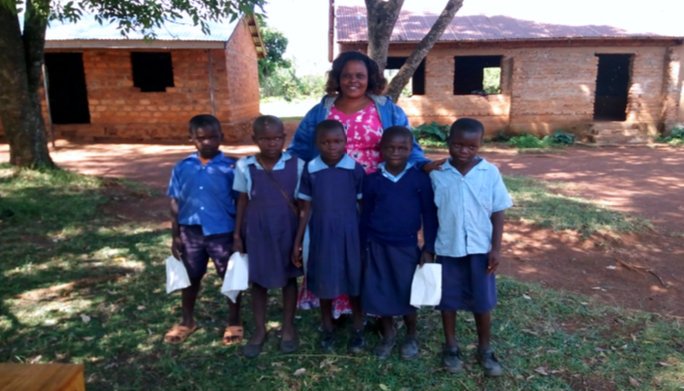Caroline Akinyi Okore is a government teacher at St. Luke’s Primary School in Malunga, where she has instructed for the last fifteen years. She teaches lower grades classes whose learners are between the ages of five and ten.
Caroline shared, “I started engaging with the Nuru Kenya Education Program in January of this year when they introduced their program at St. Luke’s school. I have taught learners reading at different levels in those age groups. The teachers training sessions organized by Nuru Kenya Education Program (in April) opened me up to more teaching techniques that can help me facilitate reading lessons to learners in the lower grades.”
During Nuru Kenya’s teachers training sessions in April, Caroline was able to learn literacy activities and techniques which she found helpful in lesson planning and professional development. Some of the literacy activities she integrated into her lessons include:
- Word reading during Math Lessons to promote practice of reading skills during math.
- Segmenting and blending sounds during English and Swahili lessons. For example: Sounding out the word cat with sound “c” “a” and “t” and practicing spelling the word with learners.
- Vocabulary instruction: learners getting to know the meaning of simple, frequently used words such as “bird”, “they”, “go”, “far”, etc…
- Story reading (Comprehension): Asking questions to see if learners have understood the story text used during the lessons. For example: Using “wh” questions like “What was the name of the cat?” and “Who took the cat home?” to check for understanding.
Caroline is attempting to use these techniques in her classroom while teaching students in grade 2, but still faces some challenges. One learner has a challenge with her eyes. The girl does not have glasses, so she tries to read but has difficulties. The rest of the learners in the class are able to identify the sounds and the letters. Some learners are able to read the story relatively well, and a few are able to read the story and answer comprehension questions, but there is still more room for improvement. Overall, the learners need to continue to work on their reading speed and punctuation. Caroline is confident this will eventually improve through practice and regular reading of storybooks.
The teachers training experience has improved Caroline’s teaching methodologies and she hopes to continue implementing the strategies in her regular teaching career moving forward. Nuru Kenya’s Education Program works with teachers in 24 rural public primary schools this year and continues to follow-up and observe teachers who participated in the April training to give them feedback and support while they practice the new techniques. Additionally, Nuru has provided some storybooks for each school so that students can practice their reading. Nuru is happy to continue to work with teachers like Caroline to achieve the goal of improving literacy to at least standard two (second grade) level among Nuru Kenya farmers’ children, so learners are not only able to read basic text, but also understand what they read.


